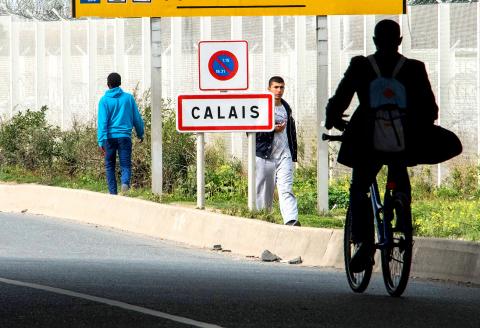A new scent is in the air in Calais, called apres-Jungle, but it is not an exotic aftershave.
Rather it sums up the northern French port’s hopes and fears for the future following the dismantling of the notorious “Jungle” refugee camp in its backyard.
The bars and restaurants of the high street, the Rue Royale, “used to be packed with Britons,” pensioner Michelle Toulotte said in a brasserie where staff outnumbered the customers.

Photo: AFP
“It’s about time” the Jungle was cleared, said Christophe Defever, owner of the Au Davydson brasserie, a stone’s throw from the town’s central rail station.
“The economy has really suffered since they’ve been here,” he said. “It’s easier to count the shops that are closed than those that are open.”
While a quick tour of the city center revealed that to be an exaggeration, the shuttered Le Tub disco in the Rue Royale attested to a more vibrant past.
The economy of Calais, a town of 72,000 people that has long been a beacon for British day-trippers hunting for a bargain, began to slump early last year when thousands of refugees converged on France’s northern shores, bent on reaching Britain.
In June, the Brexit vote in Britain, which was followed by a slump in the value of sterling, also dented business morale.
Real-estate demand has soured, especially among investors, said Evelyne Duriez, a real-estate agent in the high street.
Media accounts of the crisis have “disfigured Calais’ image” and scared off investors, Duriez said, adding that the property market has remained relatively stable for transactions between locals.
However, sheer geography is a constant minus, she said: “I’m skeptical about the apres-Jungle, because Calais is still the closest point” between French and British shores, tempting refugees to sneak onto cross-Channel trucks and trains.
The economic downturn prompted a high-profile protest last month, when truckers and farmers blocked the main routes in and out of Calais to call for the Jungle’s closure.
Under pressure from a Calais business collective, regional authorities agreed to boost the police presence on the motorway and to rapidly dismantle the lawless shantytown.
A barman said appeals for tax breaks and other relief had fallen on deaf ears.
“The government has completely ignored us,” he said on condition of anonymity.
However, he said the city, which has a center-right mayor, “can’t do much” while Socialists are in power in the central government.
Meanwhile at the tourist office, bilingual brochures abound extolling the town’s attractions, from its quirky neo-Renaissance city hall to an impressive museum devoted to the region’s lace industry.
“A Great Day in Calais” and “Shop Till You Drop” were among the headlines in a newspaper-style promotion created by the city.
The regional newspaper La Voix du Nord reported that French President Francois Hollande might visit Calais next week to mark the shutdown of the Jungle.
The success of the operation is crucial for the deeply unpopular president, who has yet to announce whether he will stand for re-election next year.
A barman in the Rue Royale was magnanimous, except when it came to Hollande.
“May the apres-Jungle be beneficial for everyone,” he said.
However, regarding Hollande’s mooted visit, he said: “May he stay home.”
Taxi driver Herve Legrand said his business has broken even thanks to the intense media focus on the Jungle crisis.
“Maybe we lost tourists, but we gained journalists” as clients, he said.

Intel Corp chief executive officer Lip-Bu Tan (陳立武) is expected to meet with Taiwanese suppliers next month in conjunction with the opening of the Computex Taipei trade show, supply chain sources said on Monday. The visit, the first for Tan to Taiwan since assuming his new post last month, would be aimed at enhancing Intel’s ties with suppliers in Taiwan as he attempts to help turn around the struggling US chipmaker, the sources said. Tan is to hold a banquet to celebrate Intel’s 40-year presence in Taiwan before Computex opens on May 20 and invite dozens of Taiwanese suppliers to exchange views

Application-specific integrated circuit designer Faraday Technology Corp (智原) yesterday said that although revenue this quarter would decline 30 percent from last quarter, it retained its full-year forecast of revenue growth of 100 percent. The company attributed the quarterly drop to a slowdown in customers’ production of chips using Faraday’s advanced packaging technology. The company is still confident about its revenue growth this year, given its strong “design-win” — or the projects it won to help customers design their chips, Faraday president Steve Wang (王國雍) told an online earnings conference. “The design-win this year is better than we expected. We believe we will win

Quanta Computer Inc (廣達) chairman Barry Lam (林百里) is expected to share his views about the artificial intelligence (AI) industry’s prospects during his speech at the company’s 37th anniversary ceremony, as AI servers have become a new growth engine for the equipment manufacturing service provider. Lam’s speech is much anticipated, as Quanta has risen as one of the world’s major AI server suppliers. The company reported a 30 percent year-on-year growth in consolidated revenue to NT$1.41 trillion (US$43.35 billion) last year, thanks to fast-growing demand for servers, especially those with AI capabilities. The company told investors in November last year that

Power supply and electronic components maker Delta Electronics Inc (台達電) yesterday said it plans to ship its new 1 megawatt charging systems for electric trucks and buses in the first half of next year at the earliest. The new charging piles, which deliver up to 1 megawatt of charging power, are designed for heavy-duty electric vehicles, and support a maximum current of 1,500 amperes and output of 1,250 volts, Delta said in a news release. “If everything goes smoothly, we could begin shipping those new charging systems as early as in the first half of next year,” a company official said. The new